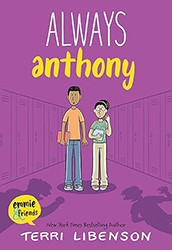Becoming Brianna, the most recent book in the Emmie & Friends series of diverse graphic novels, explores the joys and difficulties of middle school through the lens of Brianna’s upcoming bat mitzvah. Brianna’s questions about the meaning of the religious ceremony form the core of the book, but Libenson also integrates concerns about friendship, family conflicts, and financial realities into her compelling coming-of-age story. Lively and humorous pictures work together with text told from Brianna’s perspective, as she struggles to reconcile her ambivalence about the performative aspects of this event with questions of her commitment to life as part of a Jewish community.
Brianna’s account of her bat mitzvah unfolds in flashbacks, beginning with her mother’s original attempt to convince her that the ceremony should be part of Brianna’s future. Always alert to adult inconsistencies, Brianna responds to her mother’s assertion that a bat mitzvah is a “family tradition” with a factual correction; her mother’s bat mitzvah had actually been the first in their family. Young readers will appreciate Brianna’s insistence on the truth, whether in evaluating her bat mitzvah options or deciding if new friends are truly interested in getting to know her or only in receiving an invitation to a big party. Faced with rumors about the lavish entertainment which her would-be friends expect, she is forced to come to terms with her solidly middle-class family’s limits on meeting these expectations. Throughout the book, Brianna’s bat mitzvah is a challenge within the larger, stressful journey toward young adulthood.
The bat mitzvah experience is not one-size-fits all; Brianna’s is specifically situated in a relatively non-observant family. Her father isn’t Jewish and she has received — by her own choice — a limited Jewish education. Parents reading the book will empathize with the paradox of allowing children to make their own decisions and then living with the consequences of them. When Brianna reluctantly agrees to begin her bat mitzvah preparation, all the demons of her insecurity begin to wreak havoc on her emotions. In one picture, she imagines a magic spell which disperses the Hebrew letters which she has been struggling to master. In another, her recognition of the need to “compartmentalize” her concerns appears as a cross-section of her mind shown as a crowded file cabinet, with “boys” temporarily “closed for business…due to stress.” Brianna’s wry commentary on patriarchal traditions within Judaism contrasts traditional and more liberal definitions of Jewish lineage. The standard genealogy chart becomes a witty comparison between matrilineal descent and the more inclusive standard of her own temple.
When Brianna meets with her rabbi to discuss her interpretation of her Torah portion, she is forced to reconcile the most difficult contradiction of her bat mitzvah; is the ceremony really going to be the result of her choice or a concession to her mother’s needs? The sometimes strained but always loving bond between the two is entirely believable. The way in which Libenson conveys Brianna’s dilemma and gracefully associates it with biblical parallels relevant to her emerging identity, makes Becoming Brianna a memorable addition to Jewish-themed graphic fiction.
Emily Schneider writes about literature, feminism, and culture for Tablet, The Forward, The Horn Book, and other publications, and writes about children’s books on her blog. She has a Ph.D. in Romance Languages and Literatures.





